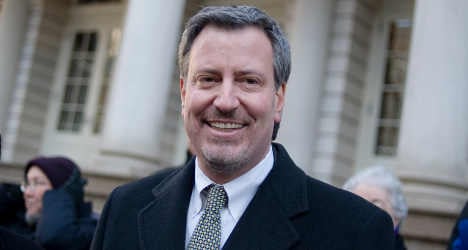Who is Bill de Blasio?
Bill de Blasio is a 52-year-old Italian-American, and on Tuesday he was elected mayor of New York with over 73 per cent of the vote.
And why is he causing such a stir in Sant'Agata de' Goti?
The mountain village in the Benevento region was the hometown of De Blasio's grandather. Along with many others from the region, he emigrated to America in search of a better life almost a century ago, but De Blasio still has some family there.
The town came out in strong support of the mayoral candidate, with posters 'Forza Bill!' plastered across the town. The mayor expressed his pride, saying, “It is obvious that he hasn't forgotten his roots. He has brought prestige to our town."
"We consider him a fellow citizen here,” a spokesman for the town council said. De Blasio is even going to be granted honorary citizenship. "His choice to name his children Chiara and Dante shows his link with Italy. He really is a son of this land," he added.
On Tuesday night an election party was held in the town's former cinema to follow the results live from across the Atlantic. The victory was celebrated with local Falanghina spumante and fireworks. The festivities are set to continue through the week.
How has De Blasio retained links to his Italian heritage?
During his time as a junior staffer for New York City’s first African-American mayor, David N. Dinkins, De Blasio would bring his mother’s eggplant parmesan and Italian bread into the office to feed the campaign staff. He also frequently holidays in Italy with his wife and children.
In his victory speech, he made sure to thank his Italian family and friends in Rome, Grassano and Sant'Agata di Goti, announcing to them, "I say grazie a tutti!”
Who else did De Blasio receive support from?
De Blasio earned praise from President Barrack Obama for his commitment to an economy which helps even the poorest New Yorkers, and received endorsement from other famous faces including actors Alec Baldwin and Susan Sarandon.
His family has also been crucial to the campaign. De Blasio is married to African-American writer and political speechwriter Chirlane McCray, who played an important part in the campaign through public speeches and Twitter. However, it was his 16-year-old son son Dante who stole the show with his impressive afro, after starring in one of De Blasio's ad campaigns. After being elected, de Blasio thanked his wife and “stylish” children.
What have been De Blasio's political achievements so far?
He began his career in public service as a junior staffer for New York City’s first African-American mayor, David N. Dinkins, and this is where he met his wife, Chirlane. After working as campaign manager for Hillary Clinton's 2000 race for Senate, he spent eight years on the City Council and in 2009 was elected Public Advocate.
He was named 'Italian of the Year' by IL, a high-end Italian magazine, earlier this year, which also tipped him to become New York mayor.
Now he's won the mayoral election, what's next on the agenda?
The first Democrat-elected mayor in 24 years, he has promised a programme of progressive change, with the slogan “no New Yorker will be left behind.” He referred to the inequality of New York as “a tale of two cities” due to the gulf between the rich and poor, and his policies champion the rights of the middle and working classes. His signature proposal is to raise taxes on the highest-earning New Yorkers and increase access to early childhood education, employment and housing.
De Blasio spoke of how New York has been synonymous with opportunity for many immigrants, perhaps with his own grandfather in mind, and expressed a desire to make this the case once more. He has already put plans in place for helping immigrants with free language lessons and tackling discrimination at work.




 Please whitelist us to continue reading.
Please whitelist us to continue reading.
Member comments